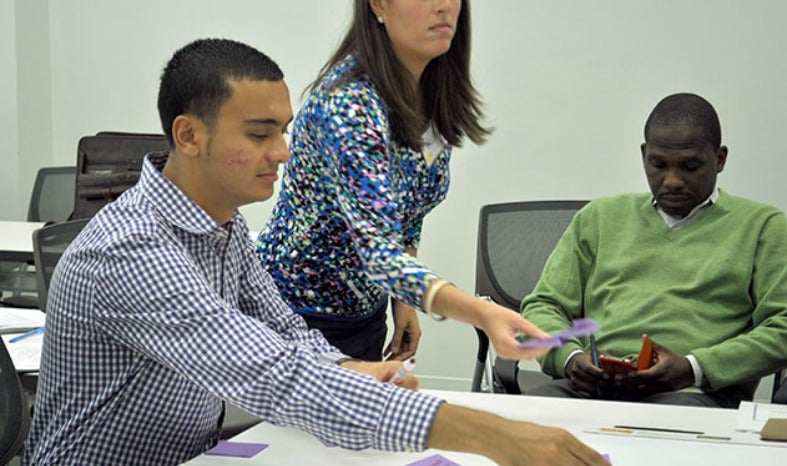Title: Georgetown, Education Dept. Use Data to Promote Opportunities for Youth
Georgetown and the U.S. Department of Education brought together members of the university, broader Washington, D.C., and higher education communities to evaluate data that could help determine solutions for the White House’s My Brother’s Keeper initiative.

August 5, 2014 – Georgetown and the U.S. Department of Education brought together members of the university, broader Washington, D.C., and higher education communities to evaluate data that could help determine solutions for the White House’s My Brother’s Keeper initiative on Aug. 2.
The Obama administration launched My Brother’s Keeper in February to close opportunity gaps faced by boys and young men of color in the United States.
Saturday’s event, a data jam session, brought together developers, designers, entrepreneurs, researchers, statisticians, policymakers, educators and students to collaborate on how to best build new tools for solving the current education challenges – early learning, literacy, college readiness, post-secondary education and training, successful entry into the workforce and reducing violence.
More than 125 participants separated into 17 different groups during the Saturday event to tackle the most pressing problems. The groups explored data from the government and nonprofit sectors and developed presentations for solutions that will be reviewed by the education department and the Obama administration.
Design-Thinking into Action
“The data jam session is another way Georgetown is finding innovative ways to have an impact in our community,” said Sonal Shah, executive director of the Beeck Center for Social Impact and Innovation, which took the lead in organizing the event at Georgetown. “It was a great way for us to bring together data experts with technical experts and community people to put design-thinking into action.”
Jim Shelton, deputy secretary at the department of education and executive director of the My Brother’s Keeper initiative, said the collective work around a common purpose that occurred at the data jam is what My Brother’s Keeper is all about.
“My colleagues at the department of education and across the administration were pleased to work with Georgetown University and thankful for the leadership of the Beeck Center for Social Impact and Innovation,” he said. “We look forward to what comes next after Saturday’s event and to our ongoing collaboration with the Beeck Center and the innovative, community of change agents they are helping to foster.”
Moving Forward
Georgetown and the education department held two other My Brother’s Keeper sessions – one with members of the Georgetown community and a second with members of the D.C. community – prior to Saturday’s data jam event.
“The sessions served as an introduction to the collaborative work we’re doing. By using the data, we’re able to tell the story that explains the problems that need to be solved,” Shah said.
My Brother’s Keeper is joining with cities and towns, businesses, and foundations that are taking steps to connect young people to mentoring, support networks and the skills they need to find a good job or go to college and work their way into the middle class.
“The valuable input we received from the teams that were formed at the data jam,” Shelton said, “will inform the work of the initiative moving forward.”